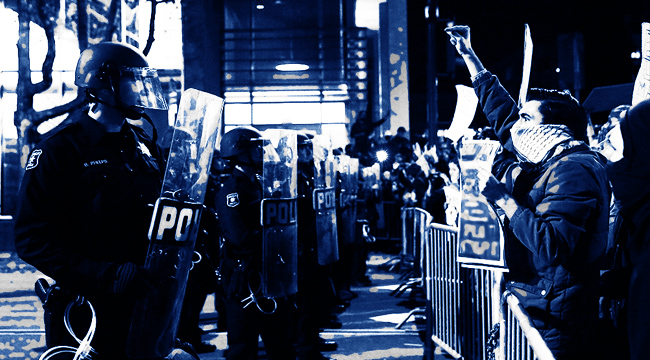
With the tragedy of the Charlottesville murder of Heather Heyer and the increasingly angry response to Nazi and fascist marches, some are trying to figure out, or attempting to lump Nazis in with, the “antifa” movement. But nailing down exactly what antifa — short for “anti-fascist” — is … well, that’s far more complicated than figuring out where Nazis stand.
Anti-fascists aren’t really one particular group. Really, in the broadest sense, anybody opposed to Nazis is “anti-fascist.” And anti-fascism, including acts of aggression, has long, long roots, going back to the very beginning, when Italian leftist groups organized against Mussolini. American anti-fascism has, in part, a history in the punk scene, where fascism was such a problem that “Nazi Punks F*ck Off” by the Dead Kennedys became the rallying cry of a protest movement, where the aforementioned Nazi punks were often beaten up.
In the modern U.S., the label tends mostly to be applied to more militant leftist groups that are more likely to use aggressive tactics against fascists and racists. That said, that’s still overly broad. Some specifically use the label, such as NYC Antifa. Still others are anti-government or anarchist groups that have taken up the label due to their belief that Trump is a fascist, although just how these terms are applied can vary from group to group. Others are simply organizations that will use a show of force, not necessarily violence, to go after and disrupt white nationalists and other fascist groups, such as, for example, forcing pro-fascist websites to change domains or outing fascists to friends, family and employers.
Despite what some, notably Trump, would insist, leftist groups are far from united on the behavior and tactics of groups that refer to themselves as antifa. Some are specifically peaceful groups, and there remains strong philosophical disagreement about whether violence is an effective protest tactic or even a worthy reaction to violence. A critical profile of the movement in The Atlantic notes that support for it has only recently become more prevalent among other left-leaning groups:
“Suddenly,” noted the antifa-aligned journal It’s Going Down, “anarchists and antifa, who have been demonized and sidelined by the wider Left have been hearing from liberals and Leftists, ‘you’ve been right all along.’ ” An article in The Nation argued that “to call Trumpism fascist” is to realize that it is “not well combated or contained by standard liberal appeals to reason.” The radical left, it said, offers “practical and serious responses in this political moment.”
However, groups, such as the “religious left,” a term equally as murky as antifa, often remain morally or philosophically opposed. Some also ask whether it’s truly American to greet any opinion, no matter how reprehensible, with force. When discussing the issue with NPR, political extremism expert JJ McNab was pointedly critical of left-wing violence even while arguing we’re in a cycle of right-wing violence:
“This is a dangerous game; people are going to die. No one’s died yet, but it’s just a matter of time,. These guys are odious, [but] attack them with words. Don’t come in with sticks and nails in them.”
That said, there is one crucial difference between fascists and anti-fascists: Fascists are much more dangerous. The data shows that fascists present more of a threat than anti-fascists, and before 9/11, the deadliest terrorist attack on U.S. soil was perpetrated by Timothy McVeigh, a right-wing terrorist who killed 161 people with a truck bomb in Oklahoma City in 1995; and there’s simply no equivalent to that from the left anywhere in American history. Indeed, a cursory look at terrorist incidents on American soil finds that, especially since 1980, the vast majority of domestic terrorism has come from the right, usually thanks to the so-called “sovereign citizens” movement, which itself has roots all the way back to the 1940s American fascist organization called The Silver Shirts.
Whether violence is a publicly acceptable response to a situation, especially a political one, is likely a question that will never be settled, and it’s more pressing for marginalized communities. For many communities, when fascists show up, it means there is somebody at your doorstep, armed, threatening to attack you, or your neighbors, for no other reason than the fact that you or they exist. This is the fundamental difference between fascist and anti-fascist, the former is an attack, the latter, in the end, is a reaction. Whether violence is acceptable or not depends on each person, their morals, and the exact situation. But if somebody is going to go around screaming that they’re going to kill people, they shouldn’t be surprised if their targets fight back.
